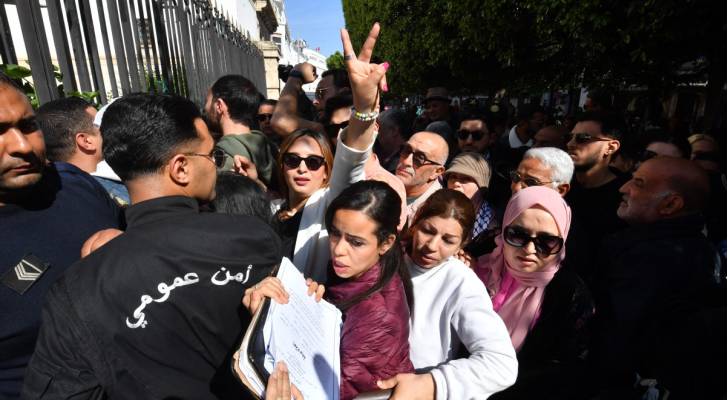In front of the courthouse in Tunis as the trial of dozens of Tunisian opposition figures resumed (Credit: AFP)
Tunisian court jails opposition figures for up to 66 years in national security case
A Tunisian court has issued prison sentences ranging from 13 to 66 years against dozens of individuals—among them high-profile opposition leaders—on charges linked to national security, according to local media reports on Saturday.
The sweeping verdicts, delivered in a highly contentious trial, have been sharply condemned by human rights groups and described by defense lawyers as a political farce. Around 40 defendants were implicated, many of whom have been outspoken critics of President Kais Saied.
The accused were convicted of “conspiracy against state security” and “membership in a terrorist organization,” according to an official from Tunisia’s anti-terrorism prosecutor’s office who spoke to local outlets including Jahwara FM.
However, some defense lawyers told Agence France-Presse (AFP) they were not informed of the rulings, and it remains unclear whether all the accused received prison terms or only a portion of them.
The list of those sentenced includes veteran opposition voices, lawyers, and business figures. While some have been behind bars for nearly two years, others are in exile or remain at large.
Among those tried in absentia is human rights advocate and former government minister Kamel Jendoubi, who condemned the court's action as a “judicial assassination.”
“This is not a judiciary ruling, but a political decree executed by judges under orders, by complicit prosecutors and by a justice minister,” Jendoubi said, accusing all involved of serving “a paranoid autocrat.”
Since President Saied consolidated power in July 2021—dismissing parliament, seizing control of the judiciary, and ruling by decree—critics have warned of Tunisia’s slide back into authoritarianism. The country had been seen as a rare democratic success story following the 2011 Arab Spring.
- Flawed proceedings and closed hearings -
On Friday evening, defense attorneys sharply criticized the conduct of the trial. After a judge concluded reading the charges, deliberations began without hearing any arguments from the prosecution or the defense.
“There were flagrant violations of judicial procedure,” said defense lawyer Samia Abbou. “The accused were not heard,” she told AFP, calling the trial a “masquerade.”
The session stretched on for most of the day, but journalists and foreign diplomats—who had previously been permitted—were barred from observing the proceedings.
Prominent political figures sentenced in the case include Jawhar Ben Mbarek, Abdelhamid Jelassi, and Issam Chebbi of the National Salvation Front coalition, along with activist Chaima Issa, former finance minister Khayam Turki, and influential businessman Kamel Eltaief.
Since the trial began on March 4, defense lawyers have demanded the presence of all defendants in court, including at least six detainees currently on hunger strike in protest.
Human Rights Watch has denounced the proceedings, warning that they are part of a broader campaign to suppress dissent. The organization said the trial is happening “in a context of repression” where President Saied is “weaponising the judicial system to target opponents and dissidents.”




